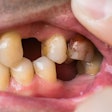
What's the best dental insurance? I get asked this question by my patients and I'm sure you do also.
It's not the dental rider on your employer's health plan. It's not the government-assisted program better known as a freebie. It's not some self-pay contraption. It's none of those obvious things.
 Alvin Danenberg, DDS.
Alvin Danenberg, DDS.The best dental insurance is your patients doing what they need to do to prevent dental disease altogether. Yup. It's all them -- with a little help from you, their diet, their lifestyle, and their motivation.
Let's be clear. Our primal ancestors hardly ever had gum disease or tooth decay. There are many reasons for this: They didn't eat processed foods, they weren't exposed to the environmental toxins of today, and they didn't live with the chronic psychological stress that many of us are coping with. Oh, yeah, they ate nutrient-dense foods and lived an active lifestyle.
All those things provided nourishment for their cells to survive and thrive, maintained diverse and healthy gut bacteria, and sustained an intact intestinal lining.
6 steps
In today's world, we can't duplicate what was around in the Paleolithic era. And, we wouldn't want to live that way. But, today we can incorporate the best of that world with the best of our current way of life.
Here are the steps I recommend to my patients to provide ourselves with the best dental insurance -- and, for that matter, overall health insurance.
“The best dental insurance is your patients doing what they need to do to prevent dental disease altogether.”
- Consume nutrient-dense foods. A Paleo-type diet stands out as being the best from my personal research and experience.
- Sleep restoratively. Sleep about seven to eight hours a night starting from the hours between 9 p.m. and 11 p.m.. Make it a dark, cool, quiet room.
- Exercise efficiently. This includes a combination of some aerobic exercise; one to two days a week of brief, high-intensity interval training; one to two days a week of brief, intense strength training; and nonexercise movements during the course of most of each day.
- Reduce stress. Meditate, practice yoga, try diaphragmatic breathing, and experiment with progressive, total body muscle relaxation.
- Practice effective oral hygiene. Brush into the gum margins, floss and clean between the surfaces of each of your teeth, and scrape the topside of your tongue to remove odor-forming bacteria and microscopic food remnants.
- Visit a dental professional as necessary. Appointments don't need to be every six months. They need to be with a frequency that addresses your individual needs -- sometimes every couple of months and sometimes every few years.
There you have it. The best dental (and overall health) insurance you can have.
A version of this column first ran on Dr. Danenberg's blog. DrBicuspid.com appreciates the opportunity to reprint it. Future columns will address how dentists can serve their patients and their profession.
Alvin Danenberg, DDS, practices at the Bluffton Center for Dentistry in Bluffton, SC. He is also on the faculty of the College of Integrative Medicine and created its integrative periodontal teaching module. He also spent two years as chief of periodontics at Charleston Air Force Base earlier in his career. His website is drdanenberg.com.
The comments and observations expressed herein do not necessarily reflect the opinions of DrBicuspid.com, nor should they be construed as an endorsement or admonishment of any particular idea, vendor, or organization.


















